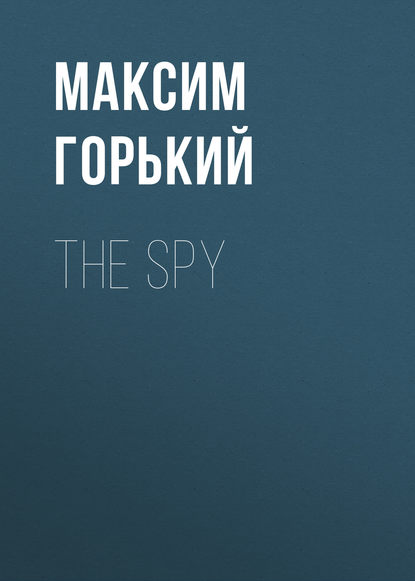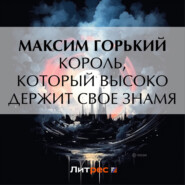По всем вопросам обращайтесь на: info@litportal.ru
(©) 2003-2024.
✖
The Spy
Настройки чтения
Размер шрифта
Высота строк
Поля
"Can I congratulate you on a successful piece of work?" asked Krasavin.
"You can. Yes." Maklakov said aloud, walking up to him.
"That's good, young man," remarked Krasavin encouragingly. His pupils with green sparks flashing in them turned inward to the bridge of his nose, and his nostrils quivered and expanded.
"But the Japs licked us after all, Gavrilo," Maklakov exclaimed merrily, rubbing his hands.
"I cannot in the least comprehend your joy in this event," said Krasavin wagging his ears. "Although it was instructive, as many say, still so much Russian blood was shed and the insufficiency of our strength was made so apparent."
"And who is to blame?"
"The Japs. What do they want? Every country ought to live within itself."
They started a discussion, to which Yevsey, rejoiced over Maklakov's attitude, did not pay any attention. He looked into the spy's face, and thought it would be well to live with him instead of Piotr, who scolded at the authorities, and maybe would be arrested as they had arrested the Smokestack.
Krasavin left. Maklakov took out the letter, read it once more, and burst into a laugh, looking at Yevsey.
"Now don't say a word about it to anybody. Do you understand? He came out himself?"
"Yes. He came out, and said, 'Get away from here.'" Yevsey smiled guiltily.
"You see another one in his place would have stroked you with a cat's paw." Screwing up his eyes the spy looked through the window, and said slowly, "Yes, you ought to take to peddling wares. I told you so. To-day you are free. I have no more commissions for you. Be off with you. Have a good time. I'll try one of these days to fix you up differently. Good-by."
Maklakov held out his hand. Yevsey touched it gratefully, and walked away happy.
CHAPTER XV
A few weeks later Klimkov began to feel freer and more at ease. Every morning, warmly and comfortably dressed, with a box of small wares on his breast, he went to receive orders either at one of the cafés where the spies gathered, or at a police office, or at the lodging of one of the spies. The directions given him were simple and distinct.
"Go to such and such a house. Get acquainted with the servants. Find out how the masters live."
If he succeeded in penetrating to the kitchen of the given house, he would first try to bribe the servants by the cheap price of the goods and by little presents. Then he would carefully question them about what he had been ordered to learn. When he felt that the information gathered was insufficient, he filled up the deficiency from his own head, thinking it out according to the plan draughted for him by the old, fat, and sensual Solovyov.
"These men in whom we are interested," Solovyov once said in a smug, honey-sweet voice, "all have the same habits. They do not believe in God, they do not go to church, they dress poorly, but they are civil in their manners. They read many books, sit up late at night, often have gatherings of guests in their lodgings, but drink very little wine, and do not play cards. They speak about foreign countries, about systems of government, workingmen's socialism and full liberty for the people. Also about the poor masses, declaring it is necessary to stir them up to revolt against our Czar, to kill out the entire administration, take possession of the highest offices, and by means of socialism again introduce serfdom, in which they will have complete liberty." The warm voice of the spy broke off. He coughed and heaved a sentimental sigh. "Liberty – everybody likes and wants to have liberty. But if you give me liberty, maybe I'll become the first villain in the world. That's it. It is impossible to give even a child full liberty. The Church Fathers, God's saints, even they were subject to temptations of the flesh, and they sinned in the very highest. People's lives are held together, not by liberty but by fear. Submission to law is essential to man. But the revolutionists reject law. They form two parties. One wants to make quick work with the ministers and the faithful subjects of the Czar by means of bombs, etc. The other party is willing to wait a little; first they'll have a general uprising, then they'll kill off everybody at once." Solovyov raised his eyes pensively, and paused an instant. "It is difficult for us to comprehend their politics. Maybe they really understand something. But for us everything they propose is an obnoxious delusion. We fulfil the will of the Czar, the anointed sovereign of God. And he is responsible for us before God, so we ought to do what he bids us. In order to gain the confidence of the revolutionists you must complain, 'Life is very hard for the poor, the police insult them, and there's no sort of law.' Although they are people of villainous intent, yet they are credulous, and you can always catch them with that bait. Behave cannily toward their servants; for their servants aren't stupid, either. Whenever necessary, reduce the price of your goods, so that they will get used to you and value you. But guard against exciting suspicion. They will begin to think, 'What is it? He sells very cheap, and asks prying questions.' The best thing for you to do is to strike up friendships. Take a little dainty, hot, full-breasted thing, and you'll get all sorts of good information from her. She will sew shirts for you, and invite you to spend the night with her, and she will find out whatever you order her to. You know – a tiny, soft little mouse. You can stretch your arm a long distance through a woman."
This round man, hairy-handed, thick-lipped, and pock-marked, spoke about women more frequently than the others. He would lower his soft voice to a whisper, his neck would perspire, his feet would shuffle uneasily, and his eyes, minus eyebrows and eyelashes, would fill with warm, oily moisture. Yevsey with his sharp scent observed that Solovyov always smelt of hot, greasy, decayed meat.
In the chancery the spies had been spoken of as people who know everything, hold everything in their hands, and have friends and helpers everywhere. Though they could seize all the dangerous people at once, they were not doing so simply because they did not wish to deprive themselves of a position. On entering the Department of Safety everyone swore an oath to pity nobody, neither father, mother, nor brother, nor to speak a word to one another about the sacred and awful business which they vowed they would serve all their lives.
Consequently Yevsey had expected to find sullen personalities. He had pictured them as speaking little in words unintelligible to simple people, as possessing the miraculous perspicacity of a sorcerer, able to read a man's thoughts and divine all the secrets of his life.
Now from his sharp observation of them he clearly saw they were not unusual, nor for him either worse or more dangerous than others. In fact, they seemed to live in a more comradely fashion than was common. They frankly spoke of their mistakes and failures, even laughed over them. All without exception were equally fervent in swearing at their superiors, though with varying degrees of malice.
Conscious of a close bond uniting them they were solicitous for one another. When it happened that someone was late for a meeting or failed to appear at all, there was a general sense of uneasiness about the absentee, and Yevsey, Zarubin, or someone of the numerous group of "novices," or "assistants" was sent to look for the lost man at another gathering place.
A stranger observing them would have been instantly struck by the lack of greed for money among the majority and the readiness to share money with comrades who had gambled it away or squandered it in some other fashion. They all loved games of hazard, took a childish interest in card tricks, and envied the cleverness of the card-sharper.
They spoke to one another with ecstasy and acute envy of the revelries of the officials, described in detail the bodies of the lewd women known to them, and hotly discussed the various processes of the sexual relation. Most of them were unmarried, almost all were young, and for everyone of them a woman was something in the nature of whiskey – to give him ease and lull him to sleep. Women brought them relief from the anxiety of their dog's work. Almost all kept indecent photographs in their pockets, and looked at them with greed while talking obscenities. Such discussion roused in Yevsey a sharp, intoxicating curiosity, sometimes incredulity and nausea. He soon came to know that some of the spies practised pederasty and sodomy, and that very many were infected with secret diseases. All of them drank much, mixing wine with beer, and beer with cognac, in an effort to get drunk as quickly as possible.
Only a few of them put hot enthusiasm, the passion of the hunter, into their work. These boasted of their skill, swelling with pride as they described themselves as heroes. The majority, however, did their work wearily, with an air of being bored.
Their talks about the people whom they hunted down like beasts were seldom marked by the fierce hatred that boiled in Sasha's conversation like a seething hot-spring. One who was different from the rest was Melnikov, a heavy, hairy man with a thick, bellowing voice, who walked with oddly bent neck and spoke little. His dark eyes were always straining, as if in constant search. The man seemed to Yevsey ever to be thinking of something terrible. Krasavin and Solovyov also contrasted with the others, the one by his cold malice, the other by the complacent satisfaction with which he spoke about fights, blood-shed, and women.
Among the youth the most noticeable was Yakov Zarubin, who was constantly fidgetting about and constantly running up to the others with questions. When he listened to the conversations about the revolutionists he knitted his brows in anger and jotted down notes in his little note-book. He tried to be of service to all the important spies, though it was evident that no one liked him and that his book was regarded with suspicion.
The larger number spoke indifferently about the revolutionists, sometimes denouncing them as incomprehensible men of whom they were sick, sometimes referring to them in fun as to amusing cranks. Occasionally, too, they spoke in anger as one speaks of a child who deserves punishment for impudence. Yevsey began to imagine that all the revolutionists were empty people who were not serious, and did not themselves know what they wanted, but merely brought disturbance and disorder into life.
Once Yevsey asked Piotr:
"There, you said the revolutionists are being bribed by the Germans, and now they say differently."
"What do you mean by 'differently?'" Piotr demanded angrily.
"That they are poor and stupid, and nobody says anything about the Germans."
"Go to the devil, brother! Isn't it all the same to you? Do what you are told to do. Your color is the diamond, and you go with diamonds."
Matters of business were discussed in a lazy, unwilling way, and "You don't understand anything, brother," was a common rejoinder of one spy to another.
"And you?" would be the counter-retort.
"I keep quiet."
Klimkov tried to keep as far away as possible from Sasha. The ominous face of the sick man frightened him, and the smell of iodoform and the snuffling, cantankerous voice disgusted him.
"Villains!" cried Sasha swearing at the officials. "They are given millions, and toss us pennies. They squander hundreds of thousands on women and on various genteel folk, who, they want us to believe, work for the good of society. But it's not the gentry that make revolutions – you must know that, idiots, – the revolution grows underneath, in the ground, among the people. Give me five millions, and in one month I'll lift the revolution up above ground into the street. I'll carry it out of the dark corners into the light of day. Then – choke it!"
Sasha always contrived horrible schemes for the extermination of the noxious people. While devising them he stamped his feet, extended his trembling arms, and tore the air with his yellow fingers, while his face turned leaden, his red eyes grew strangely dim, and the spittle spurted from his mouth.
All, it was evident, looked upon him with aversion and feared him, though they were anxious to conceal the repulsion produced by his disease. Maklakov alone calmly avoided close intercourse with the sick man. He did not even give him his hand in greeting. Sasha, in his turn, who ridiculed everybody, who swore at all his comrades, setting them down as fools, plainly put Maklakov in a category by himself. He was always serious in his intercourse with the spy, and apparently spoke to him with greater will than to the rest. He did not abuse him even behind his back.
Once when Maklakov had walked out without, as usual, taking leave of him, he cried:
"The nobleman is squeamish. He doesn't want to come near me. He has the right to be, the devil take him! His ancestors lived in lofty rooms, they breathed rarefied air, ate healthful food, wore clean undergarments. He, too, for that matter. But I am a muzhik. I was born and brought up like an animal, in filth, among lice, on coarse black bread made of unbolted meal. His blood is better than mine, yes, indeed, both the blood and the brain; and the brain is the soul." After a pause he added in a lower voice, gloomily, without ridicule, "Idiots and impostors speak of the equality of man. The aristocrat preaches equality because he is an impudent scoundrel, and can't do anything himself. So of course he says, 'you are just as good a man as I am. Act so that I shall be able to live better.' This is the theory of equality."
Sasha's talks did not evoke a response from the other spies. They failed to be moved by his excitement, and listened to his growling in indifferent silence. He received sulky support, however, from one, the large Melnikov, who acted as a detective among workingmen.
"Yes," Melnikov would say, "they are all deceivers," and nod his dark unkempt head in confirmation while vigorously clenching his hairy fist.
"They ought to be killed, as the muzhiks kill horse thieves," screamed Sasha.
"To kill may be a little too much, but sometimes it would be delicious to give a gentleman a box on the ear," said Chashin, a celebrated billiard player, curly-haired, thin, and sharp-nosed. "Let's take this example. About a week ago I was playing in Kononov's hotel with a gentleman. I saw his face was familiar to me, but all chickens have feathers. He stared at me in his turn. 'Well,' thinks I, 'look. I don't change color.' I fixed him for three rubles and half a dozen beers, and while we were drinking he suddenly rose, and said, 'I recognize you. You are a spy. When I was in the university,' he said, 'thanks to you,' he said, 'I had to stick in prison four months. You are,' he said, 'a scoundrel.' At first I was frightened, but soon the insult gnawed at my heart. 'You sat in prison not at all thanks to me, but to your politics. And your politics do not concern me personally. But let me tell you that on your account I had to run about day and night hunting you in all sorts of weather. I had to stick in the hospital thirteen days.' That's the truth. The idea for him to jump on me! The pig, he ate himself fat as a priest, wore a gold watch, and had a diamond pin stuck in his tie."
Akim Grokhotov, a handsome fellow, with a face mobile as an actor's observed:
"I know men like that, too. When they are young, they walk on their heads; when the serious years come, they stay at home peacefully with their wives, and for the sake of a livelihood are even ready to enter our Department of Safety. The law of nature."
"Among them are some who can't do anything besides revolutionary work. Those are the most dangerous," said Melnikov.
"You can. Yes." Maklakov said aloud, walking up to him.
"That's good, young man," remarked Krasavin encouragingly. His pupils with green sparks flashing in them turned inward to the bridge of his nose, and his nostrils quivered and expanded.
"But the Japs licked us after all, Gavrilo," Maklakov exclaimed merrily, rubbing his hands.
"I cannot in the least comprehend your joy in this event," said Krasavin wagging his ears. "Although it was instructive, as many say, still so much Russian blood was shed and the insufficiency of our strength was made so apparent."
"And who is to blame?"
"The Japs. What do they want? Every country ought to live within itself."
They started a discussion, to which Yevsey, rejoiced over Maklakov's attitude, did not pay any attention. He looked into the spy's face, and thought it would be well to live with him instead of Piotr, who scolded at the authorities, and maybe would be arrested as they had arrested the Smokestack.
Krasavin left. Maklakov took out the letter, read it once more, and burst into a laugh, looking at Yevsey.
"Now don't say a word about it to anybody. Do you understand? He came out himself?"
"Yes. He came out, and said, 'Get away from here.'" Yevsey smiled guiltily.
"You see another one in his place would have stroked you with a cat's paw." Screwing up his eyes the spy looked through the window, and said slowly, "Yes, you ought to take to peddling wares. I told you so. To-day you are free. I have no more commissions for you. Be off with you. Have a good time. I'll try one of these days to fix you up differently. Good-by."
Maklakov held out his hand. Yevsey touched it gratefully, and walked away happy.
CHAPTER XV
A few weeks later Klimkov began to feel freer and more at ease. Every morning, warmly and comfortably dressed, with a box of small wares on his breast, he went to receive orders either at one of the cafés where the spies gathered, or at a police office, or at the lodging of one of the spies. The directions given him were simple and distinct.
"Go to such and such a house. Get acquainted with the servants. Find out how the masters live."
If he succeeded in penetrating to the kitchen of the given house, he would first try to bribe the servants by the cheap price of the goods and by little presents. Then he would carefully question them about what he had been ordered to learn. When he felt that the information gathered was insufficient, he filled up the deficiency from his own head, thinking it out according to the plan draughted for him by the old, fat, and sensual Solovyov.
"These men in whom we are interested," Solovyov once said in a smug, honey-sweet voice, "all have the same habits. They do not believe in God, they do not go to church, they dress poorly, but they are civil in their manners. They read many books, sit up late at night, often have gatherings of guests in their lodgings, but drink very little wine, and do not play cards. They speak about foreign countries, about systems of government, workingmen's socialism and full liberty for the people. Also about the poor masses, declaring it is necessary to stir them up to revolt against our Czar, to kill out the entire administration, take possession of the highest offices, and by means of socialism again introduce serfdom, in which they will have complete liberty." The warm voice of the spy broke off. He coughed and heaved a sentimental sigh. "Liberty – everybody likes and wants to have liberty. But if you give me liberty, maybe I'll become the first villain in the world. That's it. It is impossible to give even a child full liberty. The Church Fathers, God's saints, even they were subject to temptations of the flesh, and they sinned in the very highest. People's lives are held together, not by liberty but by fear. Submission to law is essential to man. But the revolutionists reject law. They form two parties. One wants to make quick work with the ministers and the faithful subjects of the Czar by means of bombs, etc. The other party is willing to wait a little; first they'll have a general uprising, then they'll kill off everybody at once." Solovyov raised his eyes pensively, and paused an instant. "It is difficult for us to comprehend their politics. Maybe they really understand something. But for us everything they propose is an obnoxious delusion. We fulfil the will of the Czar, the anointed sovereign of God. And he is responsible for us before God, so we ought to do what he bids us. In order to gain the confidence of the revolutionists you must complain, 'Life is very hard for the poor, the police insult them, and there's no sort of law.' Although they are people of villainous intent, yet they are credulous, and you can always catch them with that bait. Behave cannily toward their servants; for their servants aren't stupid, either. Whenever necessary, reduce the price of your goods, so that they will get used to you and value you. But guard against exciting suspicion. They will begin to think, 'What is it? He sells very cheap, and asks prying questions.' The best thing for you to do is to strike up friendships. Take a little dainty, hot, full-breasted thing, and you'll get all sorts of good information from her. She will sew shirts for you, and invite you to spend the night with her, and she will find out whatever you order her to. You know – a tiny, soft little mouse. You can stretch your arm a long distance through a woman."
This round man, hairy-handed, thick-lipped, and pock-marked, spoke about women more frequently than the others. He would lower his soft voice to a whisper, his neck would perspire, his feet would shuffle uneasily, and his eyes, minus eyebrows and eyelashes, would fill with warm, oily moisture. Yevsey with his sharp scent observed that Solovyov always smelt of hot, greasy, decayed meat.
In the chancery the spies had been spoken of as people who know everything, hold everything in their hands, and have friends and helpers everywhere. Though they could seize all the dangerous people at once, they were not doing so simply because they did not wish to deprive themselves of a position. On entering the Department of Safety everyone swore an oath to pity nobody, neither father, mother, nor brother, nor to speak a word to one another about the sacred and awful business which they vowed they would serve all their lives.
Consequently Yevsey had expected to find sullen personalities. He had pictured them as speaking little in words unintelligible to simple people, as possessing the miraculous perspicacity of a sorcerer, able to read a man's thoughts and divine all the secrets of his life.
Now from his sharp observation of them he clearly saw they were not unusual, nor for him either worse or more dangerous than others. In fact, they seemed to live in a more comradely fashion than was common. They frankly spoke of their mistakes and failures, even laughed over them. All without exception were equally fervent in swearing at their superiors, though with varying degrees of malice.
Conscious of a close bond uniting them they were solicitous for one another. When it happened that someone was late for a meeting or failed to appear at all, there was a general sense of uneasiness about the absentee, and Yevsey, Zarubin, or someone of the numerous group of "novices," or "assistants" was sent to look for the lost man at another gathering place.
A stranger observing them would have been instantly struck by the lack of greed for money among the majority and the readiness to share money with comrades who had gambled it away or squandered it in some other fashion. They all loved games of hazard, took a childish interest in card tricks, and envied the cleverness of the card-sharper.
They spoke to one another with ecstasy and acute envy of the revelries of the officials, described in detail the bodies of the lewd women known to them, and hotly discussed the various processes of the sexual relation. Most of them were unmarried, almost all were young, and for everyone of them a woman was something in the nature of whiskey – to give him ease and lull him to sleep. Women brought them relief from the anxiety of their dog's work. Almost all kept indecent photographs in their pockets, and looked at them with greed while talking obscenities. Such discussion roused in Yevsey a sharp, intoxicating curiosity, sometimes incredulity and nausea. He soon came to know that some of the spies practised pederasty and sodomy, and that very many were infected with secret diseases. All of them drank much, mixing wine with beer, and beer with cognac, in an effort to get drunk as quickly as possible.
Only a few of them put hot enthusiasm, the passion of the hunter, into their work. These boasted of their skill, swelling with pride as they described themselves as heroes. The majority, however, did their work wearily, with an air of being bored.
Their talks about the people whom they hunted down like beasts were seldom marked by the fierce hatred that boiled in Sasha's conversation like a seething hot-spring. One who was different from the rest was Melnikov, a heavy, hairy man with a thick, bellowing voice, who walked with oddly bent neck and spoke little. His dark eyes were always straining, as if in constant search. The man seemed to Yevsey ever to be thinking of something terrible. Krasavin and Solovyov also contrasted with the others, the one by his cold malice, the other by the complacent satisfaction with which he spoke about fights, blood-shed, and women.
Among the youth the most noticeable was Yakov Zarubin, who was constantly fidgetting about and constantly running up to the others with questions. When he listened to the conversations about the revolutionists he knitted his brows in anger and jotted down notes in his little note-book. He tried to be of service to all the important spies, though it was evident that no one liked him and that his book was regarded with suspicion.
The larger number spoke indifferently about the revolutionists, sometimes denouncing them as incomprehensible men of whom they were sick, sometimes referring to them in fun as to amusing cranks. Occasionally, too, they spoke in anger as one speaks of a child who deserves punishment for impudence. Yevsey began to imagine that all the revolutionists were empty people who were not serious, and did not themselves know what they wanted, but merely brought disturbance and disorder into life.
Once Yevsey asked Piotr:
"There, you said the revolutionists are being bribed by the Germans, and now they say differently."
"What do you mean by 'differently?'" Piotr demanded angrily.
"That they are poor and stupid, and nobody says anything about the Germans."
"Go to the devil, brother! Isn't it all the same to you? Do what you are told to do. Your color is the diamond, and you go with diamonds."
Matters of business were discussed in a lazy, unwilling way, and "You don't understand anything, brother," was a common rejoinder of one spy to another.
"And you?" would be the counter-retort.
"I keep quiet."
Klimkov tried to keep as far away as possible from Sasha. The ominous face of the sick man frightened him, and the smell of iodoform and the snuffling, cantankerous voice disgusted him.
"Villains!" cried Sasha swearing at the officials. "They are given millions, and toss us pennies. They squander hundreds of thousands on women and on various genteel folk, who, they want us to believe, work for the good of society. But it's not the gentry that make revolutions – you must know that, idiots, – the revolution grows underneath, in the ground, among the people. Give me five millions, and in one month I'll lift the revolution up above ground into the street. I'll carry it out of the dark corners into the light of day. Then – choke it!"
Sasha always contrived horrible schemes for the extermination of the noxious people. While devising them he stamped his feet, extended his trembling arms, and tore the air with his yellow fingers, while his face turned leaden, his red eyes grew strangely dim, and the spittle spurted from his mouth.
All, it was evident, looked upon him with aversion and feared him, though they were anxious to conceal the repulsion produced by his disease. Maklakov alone calmly avoided close intercourse with the sick man. He did not even give him his hand in greeting. Sasha, in his turn, who ridiculed everybody, who swore at all his comrades, setting them down as fools, plainly put Maklakov in a category by himself. He was always serious in his intercourse with the spy, and apparently spoke to him with greater will than to the rest. He did not abuse him even behind his back.
Once when Maklakov had walked out without, as usual, taking leave of him, he cried:
"The nobleman is squeamish. He doesn't want to come near me. He has the right to be, the devil take him! His ancestors lived in lofty rooms, they breathed rarefied air, ate healthful food, wore clean undergarments. He, too, for that matter. But I am a muzhik. I was born and brought up like an animal, in filth, among lice, on coarse black bread made of unbolted meal. His blood is better than mine, yes, indeed, both the blood and the brain; and the brain is the soul." After a pause he added in a lower voice, gloomily, without ridicule, "Idiots and impostors speak of the equality of man. The aristocrat preaches equality because he is an impudent scoundrel, and can't do anything himself. So of course he says, 'you are just as good a man as I am. Act so that I shall be able to live better.' This is the theory of equality."
Sasha's talks did not evoke a response from the other spies. They failed to be moved by his excitement, and listened to his growling in indifferent silence. He received sulky support, however, from one, the large Melnikov, who acted as a detective among workingmen.
"Yes," Melnikov would say, "they are all deceivers," and nod his dark unkempt head in confirmation while vigorously clenching his hairy fist.
"They ought to be killed, as the muzhiks kill horse thieves," screamed Sasha.
"To kill may be a little too much, but sometimes it would be delicious to give a gentleman a box on the ear," said Chashin, a celebrated billiard player, curly-haired, thin, and sharp-nosed. "Let's take this example. About a week ago I was playing in Kononov's hotel with a gentleman. I saw his face was familiar to me, but all chickens have feathers. He stared at me in his turn. 'Well,' thinks I, 'look. I don't change color.' I fixed him for three rubles and half a dozen beers, and while we were drinking he suddenly rose, and said, 'I recognize you. You are a spy. When I was in the university,' he said, 'thanks to you,' he said, 'I had to stick in prison four months. You are,' he said, 'a scoundrel.' At first I was frightened, but soon the insult gnawed at my heart. 'You sat in prison not at all thanks to me, but to your politics. And your politics do not concern me personally. But let me tell you that on your account I had to run about day and night hunting you in all sorts of weather. I had to stick in the hospital thirteen days.' That's the truth. The idea for him to jump on me! The pig, he ate himself fat as a priest, wore a gold watch, and had a diamond pin stuck in his tie."
Akim Grokhotov, a handsome fellow, with a face mobile as an actor's observed:
"I know men like that, too. When they are young, they walk on their heads; when the serious years come, they stay at home peacefully with their wives, and for the sake of a livelihood are even ready to enter our Department of Safety. The law of nature."
"Among them are some who can't do anything besides revolutionary work. Those are the most dangerous," said Melnikov.

















